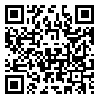Sat, Jul 12, 2025
| فارسی
Volume 25, Issue 4 (Winter 2020)
IJPCP 2020, 25(4): 396-411 |
Back to browse issues page
Download citation:
BibTeX | RIS | EndNote | Medlars | ProCite | Reference Manager | RefWorks
Send citation to:



BibTeX | RIS | EndNote | Medlars | ProCite | Reference Manager | RefWorks
Send citation to:
Mohammadkhani S, Hasani J, Akbari M, Yazdan Panah N. Mediating Role of Emotion Regulation in the Relationship of Metacognitive Beliefs and Attachment Styles With Risky Behaviors in Children of Iran-Iraq War Veterans With Psychiatric Disorders. IJPCP 2020; 25 (4) :396-411
URL: http://ijpcp.iums.ac.ir/article-1-2935-en.html
URL: http://ijpcp.iums.ac.ir/article-1-2935-en.html
1- Department of Clinical Psychology, Faculty of Psychology and Education, Kharazmi University, Tehran, Iran. , sh.mohammadkhani@gmail.com
2- Department of Clinical Psychology, Faculty of Psychology and Education, Kharazmi University, Tehran, Iran.
2- Department of Clinical Psychology, Faculty of Psychology and Education, Kharazmi University, Tehran, Iran.
Abstract: (7233 Views)
Objectives: Risk behaviors among adolescents are a major concern for mental and social health. The purpose of this study was to investigate the mediating role of adaptive and maladaptive emotion regulation strategies in the relationship of metacognitive beliefs and attachment styles with risky behaviors among adolescent children of war veterans with psychiatric disorders.
Methods: This is a descriptive correlational study conducted on 243 adolescent children of Iraq-Iran war veterans suffering from psychiatric disorders who were selected using a convenience sampling method. They responded to Cognitive Emotion Regulation Questionnaire (Short form), Revised Adult attachment Scale, Metacognitions Questionnaire for Children, and Risky Behaviors Scale.
Results: emotion regulation strategies mediated the relationship of metacognitive beliefs and attachment styles with risky behaviors. There was no significant relationship between adaptive strategies of emotion regulation and risky behaviors, and between metacognitive beliefs adaptive strategies of emotion regulation (P>0.001), but the relationship between metacognitive beliefs and maladaptive strategies was significant. All attachment styles had a direct and significant correlation with both adaptive and maladaptive strategies of emotion regulation. The presented model could explain 14% of the risky behaviors in subjects.
Conclusion: Metacognitive beliefs and attachment styles are directly and indirectly related to emotion regulation strategies and risky behaviors of the children of war veterans. These results can be used for designing the preventive programs for this group.
Methods: This is a descriptive correlational study conducted on 243 adolescent children of Iraq-Iran war veterans suffering from psychiatric disorders who were selected using a convenience sampling method. They responded to Cognitive Emotion Regulation Questionnaire (Short form), Revised Adult attachment Scale, Metacognitions Questionnaire for Children, and Risky Behaviors Scale.
Results: emotion regulation strategies mediated the relationship of metacognitive beliefs and attachment styles with risky behaviors. There was no significant relationship between adaptive strategies of emotion regulation and risky behaviors, and between metacognitive beliefs adaptive strategies of emotion regulation (P>0.001), but the relationship between metacognitive beliefs and maladaptive strategies was significant. All attachment styles had a direct and significant correlation with both adaptive and maladaptive strategies of emotion regulation. The presented model could explain 14% of the risky behaviors in subjects.
Conclusion: Metacognitive beliefs and attachment styles are directly and indirectly related to emotion regulation strategies and risky behaviors of the children of war veterans. These results can be used for designing the preventive programs for this group.
Keywords: Emotion regulation, Attachment style, Metacognition, Risky behavior, Adolescent, War veterans
Type of Study: Original Research |
Subject:
Psychiatry and Psychology
Received: 2018/11/13 | Accepted: 2019/08/19 | Published: 2020/04/18
Received: 2018/11/13 | Accepted: 2019/08/19 | Published: 2020/04/18
| Rights and permissions | |
 |
This work is licensed under a Creative Commons Attribution-NonCommercial 4.0 International License. |






